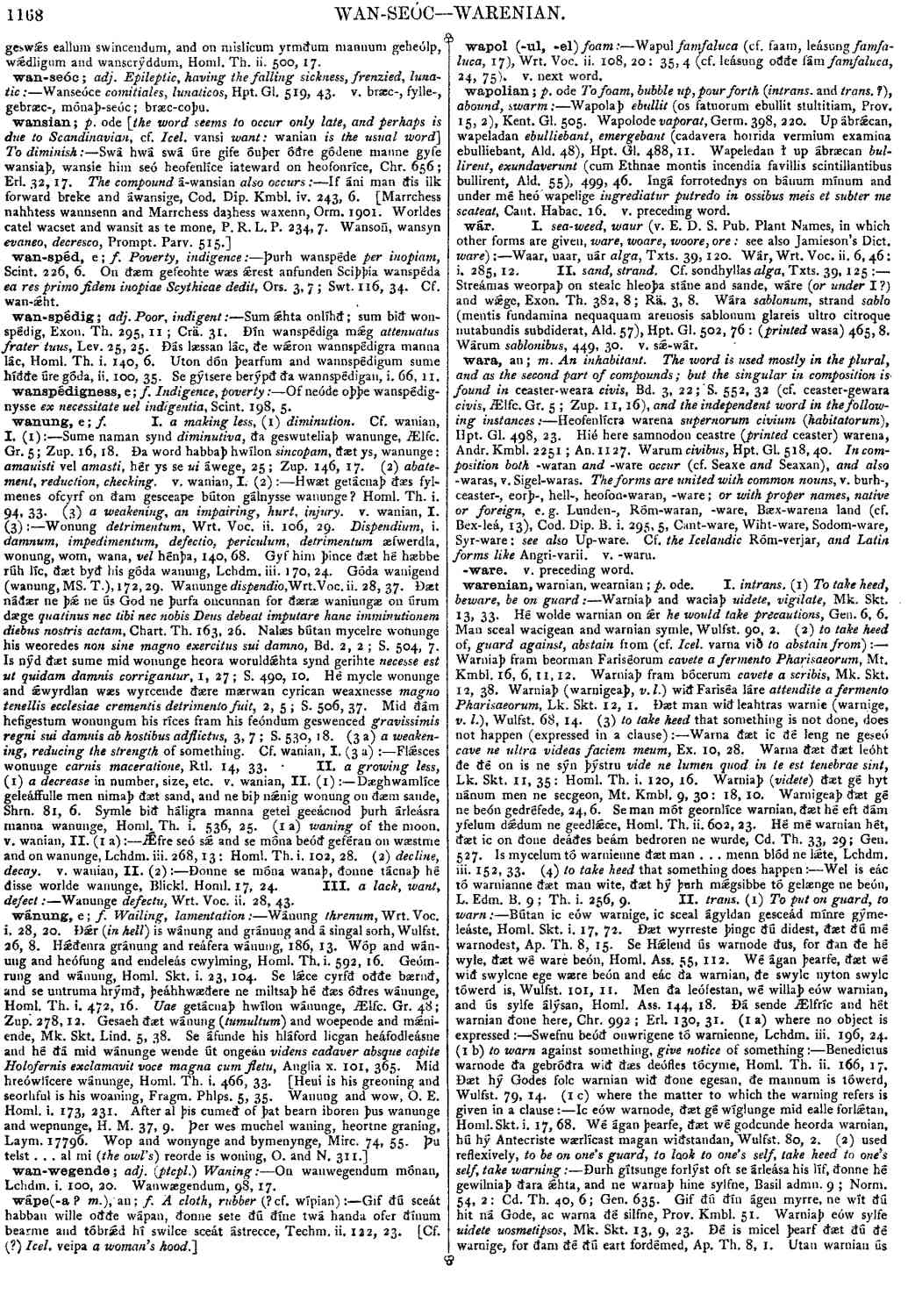warenian
- verb [ weak ]
-
Warniaþ and waciaþ
uidete, vigilate,
- Mk. Skt. 13, 33.
-
Hé wolde warnian on ǽr
he would take precautions,
- Gen. 6, 6,
-
Man sceal wacigean and warnian symle
- , Wulfst. 90, 2.
-
Warniaþ fram beorman Fariséorum
cavete a fermento Pharisaeorum,
- Mt. Kmbl. 16, 6, 11, 12.
-
Warniaþ fram bócerum
cavete a scribis.
- Mk. Skt. 12, 38.
-
Warniaþ (warnigeaþ, v. l.) wið Fariséa láre
attendite a fermento Pharisaeorum,
- Lk. Skt. 12, 1.
-
Ðæt man wið leahtras warnie (warnige,
v. l.
).- Wulfst. 68, 14.
-
Warna ðæt ic ðé leng ne geseó
cave ne ultra videas faciem meum,
- Ex. 10, 28.
-
Warna ðæt ðæt leóht ðe ðé on is ne sýn þýstru
vide ne lumen quod in te est tenebrae sint,
- Lk. Skt. II, 35: Homl. Th. i. 120, 16.
-
Warniaþ
(videte)
ðæt gé hyt nánum men ne secgeon,- Mt. Kmbl. 9, 30: 18, 10.
-
Warnigeaþ ðæt gé ne beón gedrefede,
- 24, 6.
-
Se man mót geornlíce warnian, ðæt hé eft ðám yfelum dǽdum ne geedlǽce,
- Homl. Th. ii. 602, 23.
-
Hé mé warnian hét, ðæt ic on ðone deáðes beám bedroren ne wurde,
- Cd. Th. 33, 29; Gen. 527.
-
Is mycelum tó warnienne ðæt man . . . menn blód ne lǽte,
- Lchdm. iii. 152, 33.
-
Wel is eác tó warnianne ðæt man wite, ðæt hý þurh mǽgsibbe tó gelænge ne beón,
- L. Edm. B. 9 ; Th. i. 256, 9.
-
Bútan ic eów warnige, ic sceal ágyldan gesceád mínre gýme*-*leáste,
- Homl. Skt. i. 17, 72.
-
Ðæt wyrreste þingc ðú didest, ðæt ðú mé warnodest,
- Ap. Th. 8, 15.
-
Se Hǽlend ús warnode ðus, for ðan ðe hé wyle, ðæt wé ware beón,
- Homl. Ass. 55, 112.
- Wé ágan þearfe, ðæt wé wið swylcne ege wære beón and eác ða warnian, ðe swylc nyton swylc tówerd is. Wulfst. 101, 11.
-
Men ða leófestan, wé willaþ eów warnian, and ús sylfe álýsan,
- Homl. Ass. 144, 18.
-
Ðá sende Ælfríc and hét warnian ðone here, Chr. 992 ; Erl. 130, 31. (1 a) where no object is expressed :-- Swefnu beóð onwrigene tó warnienne, Lchdm. iii. 196, 24. (1 b) to warn against something,
give notice
of something :-- Benedicius warnode ða gebróðra wið ðæs deófles tócyme,- Homl. Th. ii. 166, 17.
-
Ðæt hý Godes folc warnian wið ðone egesan, ðe mannum is tówerd,
- Wulfst. 79, 14. (1 c)
-
Wé ágan þearfe, ðæt wé godcunde heorda warnian, hú hý Antecriste wærlícast magan wiðstandan,
- Wulfst. 80, 2.
-
Ðurh gítsunge forlýst oft se árleása his líf, ðonne hé gewilniaþ ðara ǽhta, and ne warnaþ hine sylfne, Basil admn. 9 ; Norm. 54, 2: Cd. Th. 40,
- 6; Gen. 635.
-
Gif ðú ðín ágen myrre, ne wít ðú hit ná Gode, ac warna ðé silfne,
- Prov. Kmbl. 51.
-
Warniaþ eów sylfe
uidete uosmetipsos,
- Mk. Skt. 13, 9, 23.
-
Ðé is micel þearf ðæt ðú ðé warnige, for ðam ðé ðú eart fordémed,
- Ap. Th. 8, 1.
- Utan warnian úsgeorne. Wulfst. loi, 21.
-
Ðú noldest ðé warnian þurh ðínes fæder ðreále thou wouldst not take warning by thy father's punishment, Homl. Th. ii. 436, 7. (2 a)
to guard, be on one's guard
against something :-- Gif hé hine ne warenaþ wiþ ða unþeáwas,- Bt. 29, 3; Fox 106, 27.
-
Wærnaþ (warenaþ,
- Cott. MS. ) hé hine wiþ ðæt weder, 41, 3; Fox 250, 16.
-
Hié oft gesyngiaþ giet wyrs on ðæm ðæt hí hí wareniaþ wið ða lytlan scylda ðonne hí dón on myclum scyldum; for ðæm ðe hí lícettaþ hié unscyldge, ðonne hí hí wæreniaþ wid ða lytlan,
- Past. 57; Swt. 439, 18-20.
-
Ic mé [wið] his hete berh and wearnode (warnode, v. l. : waren*-*ode, Bd. M. 128, 9)
hostium vitabam insidias,
- Bd. 2, 12 ; S. 513, 28.
-
Warniaþ eów wið oferfylle,
- Homl. Th. ii. 22, 16.
-
Is ðaelig-acute;m tó cýðanne, ðæt hí hié warenigen ǽgðer ge wið ða ungemetlícan blisse ge wið ða ungemetlícan unrótnesse. . . . Is micel niédþearf ðæt mon hiene wið ðæt irre and wið ða ungemetlícan sǽlða warenige (warnige,
- Cott. MSS. ), Past. 27; Swt. 189, 1-6.
-
Ic biddle ðæt ǽlc mann hine sylfne georne wið ðisne curs warnige,
- Chart. Th. 445. 8: Wulfst. 101, 16.
-
Utan warnian ús wið his unlára, 80, 4. (2 b) where what is to be guarded against is expressed in a clause :-- Warnode hé hine ðý læs hí on hwylc hús tó him in eodan
caverat ne in aliquam domum ad se introirent,
- Bd. I. 25; S. 486, 39.
-
Hé hét hine warnian (
or
- I. 3),
-
Snyttra brúceþ ðe fore sáwle lufan warniaþ him wommas worda and dǽda
he uses wisdom, that far love of his soul wards off from himself (avoids) sins of word and deed,
- Exon. Th. 304, 32 ; Fä. 79: 305, 9; Fä. 85.
-
Ic mé warnade hyre onsýne
I avoided seeing her, denied myself her presence,
- 173. 6; Gú. 1156.
-
Óþ ðæt hé geseah his gehýrend ðone Eástordæg onfón, ðone hí symle ǽrðan wearn*-*edon (warenedon, Bd. M. 474, 20)
donec illum in Pascha diem, suos auditores, quem semper antea vitabant, suscipere videret,
- Bd. 5, 22 ; S. 644, 44.
-
Eall hé wearnige (weornige, MS.) swá fýr (syer, MS.) wudu wearnie (weornie, MS.)
let him avoid it all, as wood avoids fire,
- Lchdm. i. 384, 13.
Bosworth, Joseph. “warenian.” In An Anglo-Saxon Dictionary Online, edited by Thomas Northcote Toller, Christ Sean, and Ondřej Tichy. Prague: Faculty of Arts, Charles University, 2014. https://bosworthtoller.com/34697.
Checked: 0